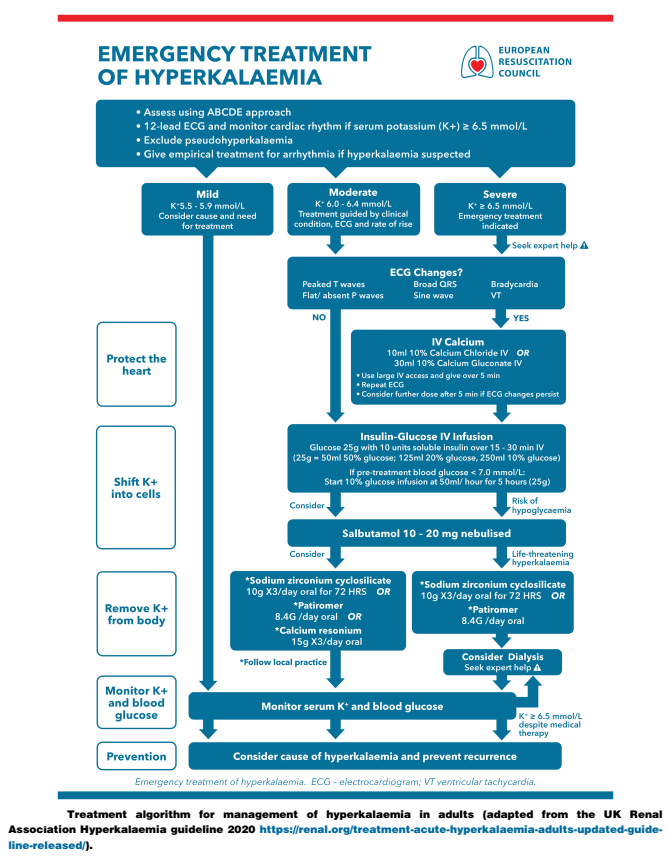The ERC Guidelines 2021: Cardiac Arrest in Special Circumstances (Part 5/7)
In the event of cardiac arrest, the most important interventions are universal. However, basic and advanced life-saving manoeuvres may require modification.
New European guidelines for cardiopulmonary resuscitation
Regardless of the cause of cardiac arrest, the most important interventions to be performed are universal and follow the pattern of the chain of survival. However, under certain conditions, basic and advanced life-saving manoeuvres may require modifications.
Made in cooperation with our partners from esanum.it
The ERC 2021 Guidelines on cardiac arrest in special situations are divided into three parts: special causes, special settings and special patient groups. The first part deals with the treatment of potentially reversible causes of cardiac arrest, for which there is a specific treatment and which must be identified or excluded during adult advanced life support (ALS). They are divided into two groups of four, according to the initial letter H or T and are therefore referred to as '4H and 4T':
- 4H: Hypoxia; Hypovolemia; Hypo-/hyperkalaemia and other electrolyte disorders; and Hypo/hyperthermia.
- 4T: Thrombosis (coronary and pulmonary); Cardiac tamponade; Tension pneumothorax; and Toxic agents (poisoning).
The second part deals with cardiac arrest in special environments, where universal guidelines have to be modified due to specific locations or location-specific causes of cardiac arrest (cardiac arrest in the operating room, during air travel, during sporting activity, in dental practices, during helicopter rescue, ...). The third part focuses on patients with specific conditions, and those with certain chronic comorbidities, where a modified approach and differential treatment decisions may be required (such as in asthma, COPD, obesity, pregnancy, etc).
There are no major changes from previous guidelines. There is more emphasis on prioritising the recognition and management of reversible causes of cardiac arrest due to special circumstances. The guidelines reflect the growing evidence for extracorporeal CPR (eCPR) as the best management strategy for selected patients with cardiac arrest in settings where it can be implemented. Given the increasing number of cardiac arrest patients from these special settings, recommendations for the management of cardiac arrest in cath labs and dialysis units have been added.
Cardiac arrest due to trauma
There is a focus on reversible causes with clear indication of the role of an 'emergency department thoracotomy' (EDT). An important note is: ‘Don’t pump an empty heart’.
The four relevant reversible causes to be treated immediately and in parallel are:
- Hypoxemia;
- Hypovolaemia;
- Hypertensive pneumothorax;
- Cardiac tamponade.
Then the treating specialist is to immediately perform haemostasis (in an extremity: tourniquet), oxygenation, bilateral mini-thoracotomy, fluid administration (or early massive transfusion and coagulation therapy) and in case of adequate situation/experience/equipment <15 min consider emergency thoracotomy.
Asthma/COPD
For the prevention of cardiac arrest in patients with asthma/COPD the following are recommended:
- Treat life-threatening hypoxia with high-flow oxygen.
- Pulse oximetry (SpO2) monitoring and oxygen supplementation: 94-98% in asthma, 88-92% in COPD.
- Steroid administration: prednisolone 40-50 mg or hydrocortisone 100 mg.
- Asthma: Consider i.v. magnesium;
- Do not routinely administer i.v. theophylline or reproterol.
Hyperkalemia
The algorithm for hyperkalemia modified. The main treatment goals in these cases are to protect the heart, shift potassium into cells, and remove potassium from the body.
Moderate hyperkalaemia (serum K+ 6.0 6.4 mmol/l) without ECG changes:
- Shift potassium inside cells: 10 IU short-acting insulin + 25 g glucose (250 ml glucose 10%) in 15-30 min (then if basal glycaemia is <126 mg/dl give 250 ml G10% in 5h);
- Remove potassium: oral administration of potassium binder (e.g. Resonium) according to local practice.
Severe hyperkalaemia (serum K+ 6.5 mmol/l) without ECG changes:
- Seek expert help early.
- Shift potassium inside cells: insulin/glucose (see above), plus salbutamol 10-20 mg by inhalation (Please note: for "typical inhaled ready to use" 1 ampoule: 1.25 mg to 2.5 ml => at least 8 ampoules!);
- Remove potassium: oral administration of potassium binder, consider dialysis.
Severe hyperkalaemia (serum K+ 6.5 mmol/l) with toxic ECG changes:
- Seek expert help early.
- Protect the heart: 10 ml calcium chloride 10% (or 30 ml calcium gluconate 10%) in 2-5 min i.v.:
- Shift potassium inside cells: insulin/glucose (see above), plus salbutamol (see above);
- Remove potassium: oral potassium binder (see above), consider dialysis.
Dialysis is the most definitive treatment for hyperkalemia. Several dialysis modalities have been used safely and effectively in cardiac arrest, but require expert help and specific equipment.
In case of cardiac arrest and hyperkalemia:
- Protect the heart: 10 ml of 10% calcium chloride (or 30 ml of 10% calcium gluconate) administered rapidly i.v.;
- Shift potassium inside cells: insulin (10 IU) + glucose (25 g) rapidly i.v., then 10% glucose solution adapted to blood glucose values, as well as sodium bicarbonate 8.4% 50ml i.v.;
- Dialysis;
- Mechanical resuscitation (mCPR) and consider Extracorporeal Life Support (ECLS).
The 2021 ERC Guidelines can be downloaded here: New ERC Guidelines.
An overview of the most important ECR Guidelines 2021 changes is available in this esanum article series:
- The ERC Guidelines 2021 (Part 1/7)
- Main Changes (Part 2/7)
- Adult Advanced Life Support (ALS) (Part 3/7)
- Peri-Arrest Arrhythmias (Part 4/7)
- Cardiac Arrest in Special Circumstances (Part 5/7)
- Post-Resuscitation Care (Part 6/7)
- Resuscitation in Children (Part 7/7)
Sources:
1. Lott C, Truhlář A, Alfonzo A, Barelli A, González-Salvado V, Hinkelbein J, Nolan JP, Paal P, Perkins GD, Thies KC, Yeung J, Zideman DA, Soar J; ERC Special Circumstances Writing Group Collaborators. European Resuscitation Council Guidelines 2021: Cardiac arrest in special circumstances. Resuscitation. 2021 Apr;161:152-219. doi: 10.1016/j.resuscitation.2021.02.011. Epub 2021 Mar 24. PMID: 33773826.
2. Fandler M. Neue Reanimationsleitlinien 2021 (ERC) Zusammenfassung. Nerdfallmedizin.de. 25/03/2021
